 полная версия
полная версияThe Classic Myths in English Literature and in Art (2nd ed.) (1911)
She waits for each and other,She waits for all men born;Forgets the earth her mother,The life of fruits and corn;And spring and seed and swallowTake wing for her and followWhere summer song rings hollow,And flowers are put to scorn. * * * * *We are not sure of sorrow,And joy was never sure;To-day will die to-morrow;Time stoops to no man's lure;And love, grown faint and fretful,With lips but half regretfulSighs, and with eyes forgetfulWeeps that no loves endure.From too much love of living,From hope and fear set free,We thank with brief thanksgivingWhatever gods may beThat no life lives forever;That dead men rise up never;That even the weariest riverWinds somewhere safe to sea.Then star nor sun shall waken,Nor any change of light;Nor sound of waters shaken,Nor any sound or sight;Nor wintry leaves nor vernal,Nor days nor things diurnal:Only the sleep eternalIn an eternal night.49

Fig. 37. A Fury
45. Tartarus and the Elysian Fields. With the ghosts of Hades the living might but rarely communicate, and only through certain oracles of the dead, situate by cavernous spots and sheer abysms, deep and melancholy streams, and baleful marshes. These naturally seemed to afford access to the world below, which with the later poets, such as Virgil, comes to be regarded as under the ground. One of these descents to the Underworld was near Tænarum in Laconia; another, near Cumæ in Italy, was Lake Avernus, so foul in its exhalations that, as its name portends, no bird could fly across it.50 Before the judges of the lower world, – Minos, Æacus, and Rhadamanthus, – the souls of the dead were brought to trial. The condemned were assigned to regions where all manner of torment awaited them at the hands of monsters dire, – the fifty-headed Hydra and the avenging Furies. Some evildoers, such as the Titans of old, were doomed to languish in the gulf of Tartarus immeasurably below. But the souls of the guiltless passed to the Elysian Fields, where each followed the chosen pursuit of his former life in a land of spring, sunlight, happiness, and song. And by the Fields there flowed the river Lethe, from which the souls of those that were to return to the earth in other bodies drank oblivion of their former lives.
46. The Islands of the Blest. Homer mentions, elsewhere, an Elysium of the western seas, which is a happy land, "where life is easiest for men: no snow is there, nor yet great storm, nor any rain; but always ocean sendeth forth the breeze of the shrill West to blow cool on men."51 Hither favored heroes pass without dying, and live under the happy rule of Rhadamanthus. The Elysium of Hesiod and Pindar is likewise in the Western Ocean, on the Islands of the Blessed, the Fortunate Isles. From this dream of a western Elysium may have sprung the legend of the island Atlantis. That blissful region may have been wholly imaginary. It is, however, not impossible that the myth had its origin in the reports of storm-driven mariners who had caught a glimpse of occidental lands. In these Islands of the Blest, the Titans, released from Tartarus after many years, dwelt under the golden sway of the white-haired Cronus.52
There was no heavy heat, no cold,The dwellers there wax never old,Nor wither with the waning time,But each man keeps that age he hadWhen first he won the fairy clime.The night falls never from on high,Nor ever burns the heat of noon;But such soft light eternallyShines, as in silver dawns of JuneBefore the sun hath climbed the sky! * * * * *All these their mirth and pleasure madeWithin the plain Elysian,The fairest meadow that may be,With all green fragrant trees for shade,And every scented wind to fan,And sweetest flowers to strew the lea;The soft winds are their servants fleetTo fetch them every fruit at willAnd water from the river chill;And every bird that singeth sweet,Throstle, and merle, and nightingale,Brings blossoms from the dewy vale, —Lily, and rose, and asphodel, —With these doth each guest twine his crownAnd wreathe his cup, and lay him downBeside some friend he loveth well.5347. Pluto (Hades) was brother of Jupiter. To him fell the sovereignty of the lower world and the shades of the dead. In his character of Hades, the viewless, he is hard and inexorable.
By virtue of the helmet or cap given him by the Cyclopes, he moved hither and yon, dark, unseen, – hated of mortals. He was, however, lord not only of all that descends to the bowels of the earth, but of all that proceeds from the earth; and in the latter aspect he was revered as Pluto, or the giver of wealth. At his pleasure he visited the realms of day, – as when he carried off Proserpina; occasionally he journeyed to Olympus; but otherwise he ignored occurrences in the upper world, nor did he suffer his subjects, by returning, to find them out. Mortals, when they called on his name, beat the ground with their hands and, averting their faces, sacrificed black sheep to him and to his queen. Among the Romans he is known also as Dis, Orcus, and Tartarus. But Orcus is rather Death, or the Underworld, than ruler of the shades.
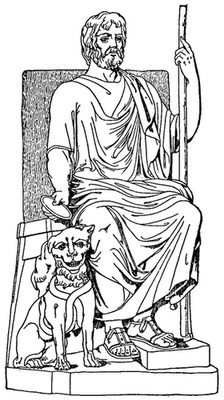
Fig. 38. Hades
48. Proserpina (Persephone) was the daughter of Ceres and Jupiter. She was queen of Hades, – a name applied both to the ruler of the shades and to his realm. When she is goddess of spring, dear to mankind, Proserpina bears a cornucopia overflowing with flowers, and revisits the earth in duly recurring season. But when she is goddess of death, sitting beside Pluto, she directs the Furies, and, like her husband, is cruel, unyielding, inimical to youth and life and hope. In the story of her descent to Hades will be found a further account of her attributes and fortunes.
49. The Lesser Divinities of the Underworld were:
1. Æacus, Rhadamanthus, and Minos, sons of Jupiter and judges of the shades in the lower world. Æacus had been during his earthly life a righteous king of the island of Ægina. Minos had been a famous lawgiver and king of Crete. The life of Rhadamanthus was not eventful.
2. The Furies (Erinyes or Eumenides), Alecto, Tisiphone, and Megæra, born of the blood of the wounded Uranus. They were attendants of Proserpina. They punished with the frenzies of remorse the crimes of those who had escaped from or defied public justice. The heads of the Furies were wreathed with serpents.
3. Hecate, a mysterious divinity sometimes identified with Diana and sometimes with Proserpina. As Diana represents the moonlight splendor of night, so Hecate represents its darkness and terrors. She haunted crossroads and graveyards, was the goddess of sorcery and witchcraft, and wandered by night, seen only by the dogs whose barking told of her approach.
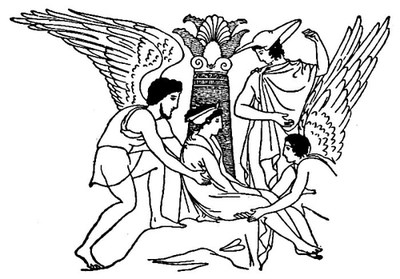
Fig. 39. Death, Sleep, and Hermes laying a Body in the Tomb
4. Sleep, or Somnus (Hypnos), and Death (Thanatos), sons of Night.54 They dwell in subterranean darkness. The former brings to mortals solace and fair dreams, and can lull the shining eyes of Jove himself; the latter closes forever the eyes of men. Dreams, too, are sons of Night.55 They dwell beside their brother Death, along the Western Sea. Their abode has two gates, – one of ivory, whence issue false and flattering visions; the other of horn, through which true dreams and noble pass to men.56
CHAPTER V
THE GODS OF THE WATERS 57
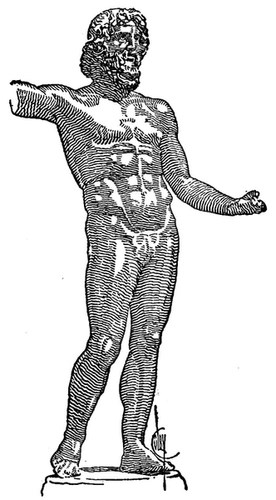
Fig. 40. Poseidon
50. The Older Dynasty. There were two dynasties of the sea. The Older, which flourished during the rule of Cronus, was founded by the Titans, Oceanus and Tethys, from whom sprang three thousand rivers and ocean-nymphs unnumbered. The palace of Oceanus was beyond the limits of the bountiful earth,58 surrounded by gardens and all things fair. From ages immemorial another dweller in the glimmering caves of Ocean was Pontus (the deep sea or the waterway), who became, by Mother Earth, father of Nereus. This Nereus, a genial old man of the sea, was distinguished for his prophetic gifts, his knowledge, his love of truth and justice. Taking to wife one of the daughters of Oceanus, the nymph Doris, he was blessed with a family of fifty fair daughters, the Nereïds.59 Of these daughters the most famous are Panope, Galatea, Thetis, and Amphitrite; the last of whom gave her hand to Neptune (Poseidon), brother of Jove, and thus united the Older and the Younger dynasties of the sea.
51. Of the Younger Dynasty of the waters Neptune and Amphitrite were the founders. Neptune's palace was in the depths of the sea, near Ægæ in Eubœa; but he made his home on Olympus when he chose. The symbol of his power was the trident, or three-pronged spear, with which he could shatter rocks, call forth or subdue storms, and shake the shores of earth. He created the horse and was the patron of horse races. His own steeds were brazen-hoofed and golden-maned. They drew his chariot over the sea, which became smooth before him, while dolphins and other monsters of the deep gamboled about his path. In his honor black and white bulls, white boars, and rams were sacrificed.

Fig. 41. Wedding of Poseidon and Amphitrite
52. The Lesser Divinities of the Waters60 were:
1. Triton, the son of Neptune and Amphitrite, trumpeter of Ocean. By his blast on the sea-shell he stirred or allayed the waves.
2. Proteus, an attendant and, according to certain traditions, a son of Neptune. Like Nereus, he was a little old man of the sea. He possessed the prophetic gift and the power of changing his shape at will.
3. The Harpies, foul creatures, with heads of maidens, bodies, wings, and claws of birds, and faces pale with hunger. They are the offspring of Thaumas, a son of Pontus and Gæa.
4. The uncanny offspring of Phorcys and Ceto, – children of Pontus, – who rejoiced in the horrors of the sea:
a. The Grææ, three hoary witches, with one eye between them which they used in turn.
b. The Gorgons, whose glance was icy death.
c. The Sirens, muses of the sea and of death, who by their sweet singing enticed seafarers to destruction.
d. Scylla, also destructive to mariners, a six-headed monster whose lower limbs were serpents and ever-barking dogs.
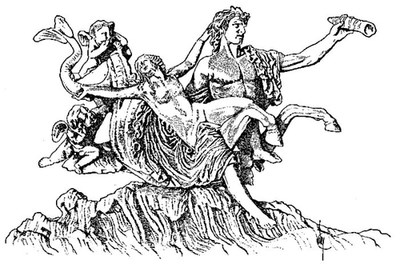
Fig. 42. Triton carrying off a Nymph
5. Atlas, who stood in the far west, bearing on his shoulders the vault of heaven. He was once regarded as a divinity of the sea, but later as a mountain. He was the son of Iapetus and the father of three classes of nymphs, – the Pleiads, the Hyads, and, according to some stories, the Hesperids. The last-mentioned, assisted by their mother Hesperis and a dragon, guarded the golden apples of the tree that had sprung up to grace the wedding of Jove and Juno. The daughters of Atlas were not themselves divinities of the sea.
6. The Water-Nymphs. Beside the Oceanids and the Nereïds, who have already been mentioned, of most importance were the Naiads, daughters of Jupiter. They presided over brooks and fountains. Other lesser powers of the Ocean were Glaucus, Leucothea, and Melicertes, of whom more is said in another section.
In the following statement of the difference between ancient and modern conceptions of nature, the poet lends new charm to the fabled rulers of the sea.
The world is too much with us; late and soon,Getting and spending, we lay waste our powers:Little we see in Nature that is ours;We have given our hearts away, a sordid boon!This sea that bares her bosom to the moon;The winds that will be howling at all hours,And are upgathered now like sleeping flowers;For this, for everything, we are out of tune;It moves us not. – Great God! I'd rather beA Pagan suckled in a creed outworn;So might I, standing on this pleasant lea,Have glimpses that would make me less forlorn;Have sight of Proteus rising from the sea;Or hear old Triton blow his wreathèd horn.61CHAPTER VI
THE ROMAN DIVINITIES
53. Gods Common to Greece and Italy. Of the deities already mentioned, the following, although they were later identified with certain Greek gods and goddesses62 whose characteristics and adventures they assumed, had developed an independent worship in Italy: Jupiter (Zeus); Juno (Hera); Minerva (Athene); Diana (Artemis); Mars (Ares); Venus (Aphrodite); Vulcanus, or Mulciber (Hephæstus); Vesta (Hestia); Mercurius (Hermes); Neptunus (Poseidon); Ceres (Demeter); Liber (Bacchus); Libera (Persephone); Magna Mater, the great mother of the gods (Rhea, Cybele); Orcus (Pluto, Hades); Tellus, the Earth (Gæa).
54. Italian Gods. There were also divinities always peculiar to Roman mythology.63 Of these the more important are:
1. Saturn, an ancient Italian deity (as his name indicates) of seeds and sowing, the introducer of agriculture. Fanciful attempts were made to identify him with the Grecian god Cronus; and it was fabled that after his dethronement by Jupiter he fled to Italy, where he reigned during the Golden Age. In memory of his dominion, the feast of Saturnalia was held every year in the winter season. Then all public business was suspended; declarations of war and criminal executions were postponed; friends made presents to one another; and even slaves were indulged with great liberties. A feast was given them at which they sat at table while their masters served, to show the natural equality of men, and that all things belonged equally to all in the reign of Saturn. The wife of Saturn was Ops, goddess of sowing and harvest (later confounded with Rhea). Another Roman deity of earth was Consus, whose name means "the keeper of the stores." He is the god of the stored-up harvest; and his altar is said to have been discovered underground by Romulus. It was in the Circus Maximus and was uncovered only on the days of his festivals, the harvest home of August and the granary feast of December. The underground altar is a reminiscence of the ancient custom of storing corn underground or at any rate of burying the sacrifices offered to deities of the earth. The harvest festival was celebrated with horse races, which, originating in a very simple way with the primitive farmers, became in time the distinctive feature of the Circus Maximus.
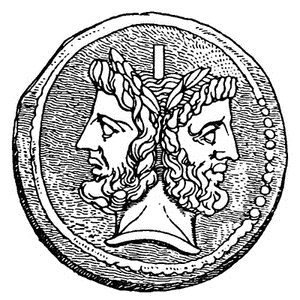
Fig. 43. Bearded Janus
2. Janus, whose name is derived from the Latin root which means "going" and is connected with janua, a passage or door, is the most distinctive and most important of the native Italic deities. He is not only the god of doors, or material openings, but more truly of beginnings, – especially of good beginnings which insure good endings. Hence undoubtedly he is represented as facing both ways; for the Romans very properly believed that beginning and ending were of the same piece, and that an undertaking ill begun could not achieve success. His temple, or covered passage, in the Forum had doors facing east and west for the beginning and ending of the day; and between stood his two-faced statue. In every home the morning prayer was addressed to him; in every domestic enterprise his assistance was implored. He was the god, also, of the opening year; hence his month, January, on the first day of which words only of good omen were uttered, and gifts were given (strenae, a name still preserved in the French word for New Year's presents, étrennes), and, for good luck, some stroke of work was bestowed on every undertaking planned for the year. He was publicly invoked not only on New Year's day, but on the first day of each month, by priests and people alike; and in these prayers his name was mentioned even before that of Jupiter. He is the god of civilization, and is sometimes called Consivius, or the Sower.64 Of course he was invoked when wars were commenced. And during their progress the doors of his temple stood always open. In peace they were closed; but they were shut only once between the reign of Numa and that of Augustus. It was natural that his worship should gradually absorb that of Sol, the Sun, who opens the day and completes the year and blesses with his rays the seeds that are sown; and such was the case. But Janus and his wife Jana were not originally connected even in name with Dianus (Sol, Apollo) and Diana (the moon).
3. Quirinus, a war-god, said to be no other than Romulus, the founder of Rome, exalted after his death to a place among the immortals.
4. Bellona, a war-goddess.
5. Lucina, the goddess who brings to light, hence the goddess of childbirth: a title bestowed upon both Juno and Diana.
6. Terminus, the god of landmarks. His statue was a rude stone or post, set in the ground to mark the boundaries of fields.
7. Faunus, the grandson of Saturn. He was worshiped as a god of fields and shepherds and also of prophecy. His name in the plural, Fauni, expressed a class of gamesome deities, like the Satyrs of the Greeks. There was also a goddess called Fauna, or Bona Dea (good goddess). To Maia, wife of Vulcan, this designation, Bona Dea, was sometimes applied.
8. Sylvanus, presiding over forest-glades and plowed fields.
9. Pales, the goddess presiding over cattle and pastures. Flora, the goddess of flowers. Pomona, presiding over fruit trees. Vertumnus, the husband of Pomona, was guardian of fruit trees, gardens, and vegetables.
Pomona loves the orchard,And Liber loves the vine,And Pales loves the straw-built shedWarm with the breath of kine;And Venus loves the whisperOf plighted youth and maidIn April's ivory moonlight,Beneath the chestnut shade.6510. The Penates, gods who were supposed to attend to the welfare and prosperity of the family. Their name is derived from Penus, the storehouse or inner chamber, which was sacred to them. Every master of a family was the priest to the Penates of his own house.
The Lares, or Lars, were also tutelary deities, but they differed from the Penates since they were regarded as the deified spirits of ancestors, who watched over and protected their descendants. The Lares were more particularly divinities presiding over the household or family; but there were also public Lares, or guardian spirits of the city, Lares of the precincts, Lares of the fields, Lares of the highways, and Lares of the sea. To the Penates, to the domestic Lares (whose images were preserved in a private shrine), and to the Manes (shades that hovered over the place of burial), the family prayers of the Romans were addressed. Other spirits, the Lemures and Larvæ, more nearly correspond to our ghosts.

Fig. 44. Genius Loci
The Romans believed that every man had his Genius and every woman her Juno; that is, a spirit who had given them being and was regarded as a protector through life. On birthdays men made offerings to their Genius, women to their Juno.
11. Other Italian deities were the gods of the rivers, such as Father Tiber, and the goddesses of the springs and brooks, such as Juturna, whose pool in the Forum was sacred. This nymph was also a goddess of healing and, according to later tradition, was beloved by Jupiter. Earlier stories, however, make her the wife of Janus and the mother of Fontus, the god of flowing waters, who had an altar on the Janiculan hill and was worshiped at an annual festival called the Fontinalia, when the wells were wreathed with garlands. Held in especial honor were the Camenæ, fountain-nymphs, goddesses of prophecy and healing (later identified with the Muses). The leader of them was Carmenta, who sang both the future and the past. With her is sometimes associated the nymph Egeria, from whom the Roman king Numa is said to have received instruction concerning the forms of worship which he introduced.
12. The Romans worshiped, also, Sol, the Sun; Luna, the Moon; Mater Matuta, the Dawn; Juventus, Youth; Fides, Honesty; Feronia, goddess of groves and freedmen; and a great number of personified abstractions of conduct and experience, such as Fortune and Health.
Many of these Latin divinities were derived from the earlier cult and ritual of the Etruscan inhabitants of Italy.
CHAPTER VII
MYTHS OF THE GREAT DIVINITIES OF HEAVEN
55. Myths of Jupiter and Juno. Not a few of the adventures of Jupiter turn upon his love affairs. Among the immortals his queen had rivals in his affection; for instance, Latona, a goddess of darkness, daughter of the Titans Cœus and Phœbe. This goddess became, as we have already seen, the mother of Apollo and Diana. The ire of Juno against her was never appeased. In consequence of it, numerous trials were visited upon Latona, some of which find a place among the adventures of her children.

Fig. 45. Ganymede
56. Love Affairs of Jupiter. Not only with immortals but with mortals were Jupiter's relations sometimes of a dubious character. His devotion to the beautiful daughters of men involved him in frequent altercations with his justly jealous spouse. Of his fondness for Danaë, whom he approached in a shower of gold, particulars are given in the story of her son Perseus; of his love for Alcmene, the granddaughter of that Perseus, we are informed in the myths of her son Hercules; and of his attentions to Leda, whom he wooed in guise of a swan, we learn in the accounts of their children Pollux and Helen. Other love passages, upon which narratives depend, concern Io, Callisto, Europa, Semele, Ægina, and Antiope.
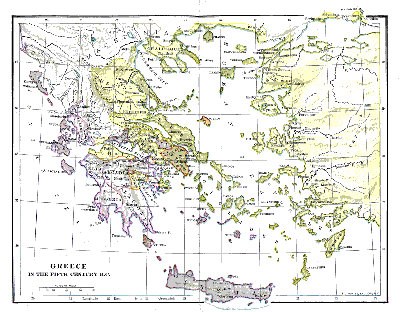
GREECE IN THE FIFTH CENTURY B.C.
57. Io 66 was of divine ancestry. Her father was the river-god Inachus, son of Oceanus. It is said that Juno one day, perceiving the skies suddenly overcast, surmised that her husband had raised a cloud to hide some escapade. She brushed away the darkness and saw him on the banks of a glassy river with a beautiful heifer standing near. Juno suspected, with reason, that the heifer's form concealed some fair nymph of mortal mold. It was Io, whom Jupiter, when he became aware of the approach of his wife, had changed into that form.
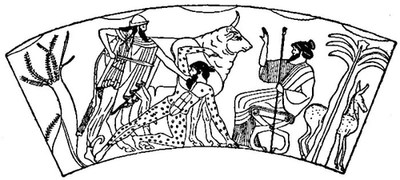
Fig. 46. Hermes Kills Argus
The ox-eyed goddess joined her husband, noticed the heifer, praised its beauty, and asked whose it was and of what herd. Jupiter, to stop questions, replied that it was a fresh creation from the earth. Juno begged it as a gift. What could the king of gods and men do? He was loath to surrender his sweetheart to his wife; yet how refuse so trifling a present as a heifer? He could not, without exciting suspicion, and he therefore consented. The goddess delivered the heifer to Argus, to be strictly watched.


